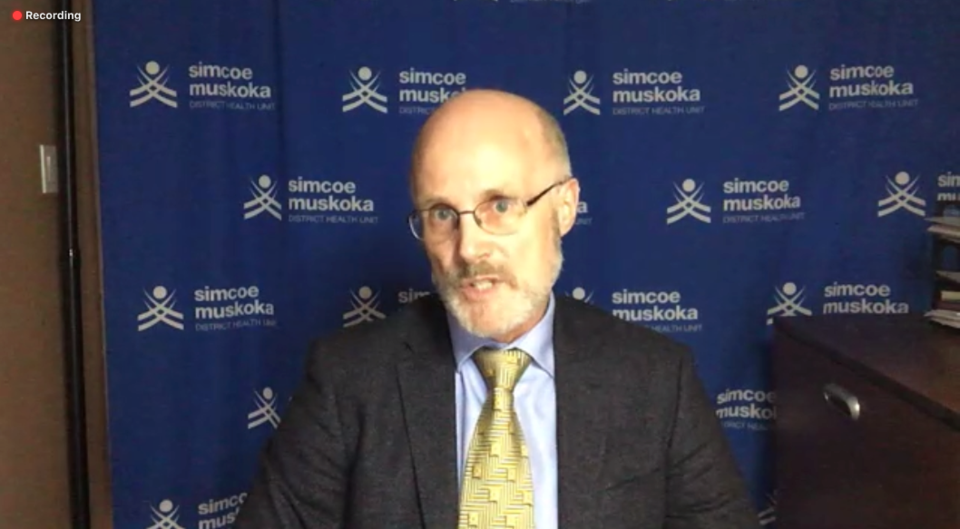The region’s medical officer of health delivered a serious warning this week, stating projections show a large surge in COVID cases over the Christmas holidays as the omicron variant becomes the dominant strain.
“We’ve got a fundamentally different situation happening right now,” said Dr. Charles Gardner during his Dec. 15 media briefing. “This may turn out to be the biggest wave we’ve had. It’s very hazardous … I think we need to fully realize the danger of the situation we’re in right now.”
There are now 26 suspected or confirmed omicron cases in the region, all of which tested positive for the indicator mutation, but most are still being sequenced at a lab for confirmation.
Gardner said the cases are spread across Simcoe County and Muskoka, and not all linked to travel, indicating the new variant is already spreading in the community.
The Ontario Science Advisory Table has noted the doubling time for the omicron strain is three days, meaning cases double every three days.
“I’m very concerned about omicron as a new variant that is rapidly overtaking the province,” said Gardner.
As for suggestions the omicron strain is “less severe,” Gardner said that’s not a fact.
“We do not have evidence that clearly supports that,” he said, noting it’s early days for the new variant, and severity may appear different in countries with younger populations versus those with older populations.
Gardner said he’s prepared to implement restrictions locally, but he’s also appealed to the province to reduce capacity limits in indoor settings to at least 50 per cent, and lower the limits for social gatherings to ten people maximum.
“Having full capacity in some settings becomes very hazardous in my opinion,” said Gardner.
Those indoor settings (bars/restaurants, sports and recreation facilities, and event centres) do require proof of double vaccination for admission, but that’s not enough, in Gardner’s mind, to curb the spread of the new variant.
“With omicron, you cannot rely on two doses of vaccine to be effective, and it is considerably more transmissible as well,” said Gardner.
In the absence of provincial restrictions, Gardner will implement those restrictions in Simcoe-Muskoka starting Dec. 20.
“This certainly is a major setback … I have no doubt everybody is fatigued by this situation, this kind of setback is heartbreaking,” said Gardner.
The health unit has redirected all its resources to COVID-19 response, with most staff focusing on vaccination, which will include third doses.
Gardner expects there will be news soon to announce a shorter interval between second and third doses, but currently, the interval for most people is 168 days between the second and third dose.
Gardner encouraged Simcoe-Musoka residents to get every dose of vaccine they are eligible to receive, to limit social contacts, and to follow public health precautions with diligence, even in the face of pandemic fatigue.
"This is a very vulnerable time right now," said Gardner. "I think we all collectively need to do all we can to deal with it."
Heading into the potential omicron wave, Gardner said a shortage in health human resources has left not only the health unit weakened in its response to track cases and close contacts and declared outbreaks where they have discovered clusters of cases, it also has local hospitals concerned.
“In reaching out to CEOs of hospitals in Simcoe-Muskoka, I’ve been informed they are very concerned about their capacity … their capacity is not what it used to be,” said Gardner. “There’s been a loss of health human resources due to the experience of the first two waves, and they are heavily burdened with catch up procedures.”
The CEOs of Collingwood General and Marine Hospital, Orillia Soldiers’ Memorial Hospital, Georgian Bay General Hospital, Stevenson Memorial Hospital, Royal Victoria Regional Health Centre, and Muskoka Algonquin Healthcare each declared their support for any action to curb further spread.
“CGMH supports the new measures, as we continue to face health human resource challenges, while trying to add extra employees in preparation for a potential winter surge,” stated Norah Holder, president and CEO of Collingwood General and Marine Hospital in a news release issued by the health unit. “Inpatient occupancy has been steadily rising over the past few weeks and we are hopeful these new measures will help slow the spread of the virus and provide hospitals with the much-needed capacity to care for sick patients, along with the influx of patients to emergency departments that are commonly seen over the holiday period and winter months.”



